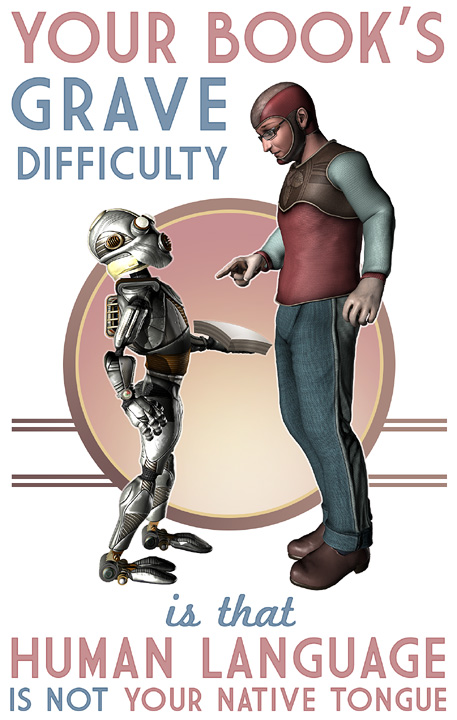

This may confuse you. It confused me. In your case, though, I may be able to clear things up by directing you here and here, where you’ll find that in my real world editor’s absence I’ve been taking feedback from my imaginary editor, instead.
This may not be less confusing. I can’t help you there.
I’ve got two big objections to my imaginary editor this week. Since it’s just you and me here, I’m going to share them.
First off, this week’s feedback isn’t constructive. In fact it crashes through the walls of constructive criticism and roars down the road through a cascade of nuns and orphans, only to plow into a ditch filled with kittens; then it explodes into a roiling, toxic cloud of what we have to call destructive criticism.
This may sound harsh.
Honestly, though, how am I supposed to improve my manuscript based on this kind of feedback? I’d have to travel back in time and make sure that human language was at the top of my to-do list before I even got out of the crib. And, you know, that’s pretty much how I think things went. I mean, my ‘first word’ was actually a complete sentence, which was “Get this stuff off of me!”.
So the utter brutality of this message is my first objection.
My second objection to this is that I have it on pretty good authority that it’s not even original. The story is that Harlan Ellison, at a writers’ workshop, once delivered this same bombshell to a writer who I’m pretty sure was not having the best day of his or her life just then.
So my imaginary editor cheats. Of course if you’re going to steal it’s good practice to steal from the best, and that would have to be Ellison. But it’s still stealing.
So I’m wondering whether I can leverage this plagiarism in some way. Risky, I know. But I’m starting to suspect that the history of publishing may be filled with these little stories of extortion, blackmail, and mayhem. There’s Christopher Marlowe, for example. There’s François Villon. And there’s my imaginary editor.
Times like these, I really wish I could have my real editor back. He seems like such a nice guy, especially now that I’ve seen the alternative.
Publishing? Not for the squeamish. Not for the weak. And apparently not for robots, either.




As a non-imaginary editor, I have to say I love your imaginary one. No, I don’t approve of mowing down nuns, orphans, or kittens (as such), but your real articles about his imagined comments are pure gold. I laughed out loud three times before I got past paragraph three.
Good stuff.
Oh, and quite well written, too.
Well… I’m glad that my imaginary editor has inspired love. Really. I’m very happy for him. Honest.
And one can hope that if he reads this, well, that he’ll soften a little bit. I don’t know a lot about him; I just have this feeling that he’s had a difficult life.